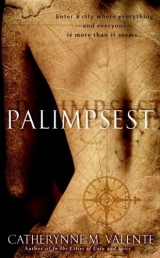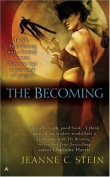
Текст книги "Palimpsest"
Автор книги: Catherynne M. Valente
Жанр:
Классическое фэнтези
сообщить о нарушении
Текущая страница: 6 (всего у книги 19 страниц)
PART II:
THE GATE OF HORN
ONE
WEEPHOLES
Sei had never been comfortable in the presence of books. Their natural state was to be shut, closed, to grin pagily from shelves, laughing at her, promising so much and delivering such meanness, such thinness. They displayed only men and women with dead eyes and rituals of living she could not understand. When closed, books gave impressions of perfection. They did not need her.
Sei’s mother had once sat with her in a room with a grass floor and windows of paper. Sei had been very small. She had not yet ridden a train. In that room she had felt as though she were secretly inside a book, walled up in paper, sewn up with grass along her spine. Her mother’s hair was so long and flat it glittered like a hard stone seen through seven inches of water. Usagi was named for the rabbit in the moon, and Sei thought in those days that her mother hid a silver hammer in her yellow yukatawith orange cranes on the sleeves, just out of her sight, and mashed rice and sugar in a great pearly barrel while Sei slept. She tried to stay up and catch her at it, but the mother of Sei was clever and quick.
“Imagine a book at the bottom of a lake,” Usagi had said, pinching Sei’s toes through her tabi-socks. “Fish read it. They wriggle into the spaces between the pages and eat up the words like rice. But the Sei-fish, who was very plump and blue and not like the other fish, could not fit in between the pages, and so was very hungry, and swam around the book eight times. Then the Sei-fish came to her mother, and the Usagi-fish said:
“‘My daughter, why do you weep?’
“‘Because I cannot read the book at the bottom of the lake, which all the other fish love,’ said the Sei-fish.
“‘Don’t cry, my child, for I have read this book and I will feed you all the things inside it, one by one, so that you will not be hungry and fill the lake with your tears.’”
Sei twisted around, bunching up her persimmon-colored holiday obi. She put a small hand on her mother’s face.
“But Usagi-fish, should I not someday read for myself?”
“It is not necessary, my little squash-flower, for I can read it, and I will always be here.”
Thus books had always been slavish footmen in her mother’s maddening court, sullen things that would not admit her. She learned her kanji and her katakana with a bent and proper head, but she did not read for pleasure, neither fiction nor histories nor philosophy. Other fish might own books, might love them, might know their secrets.
And so it was that Sei had been kept pure for this book, its true bride, untouched by other narratives, naïve of the wiles of any previous structures, voices, imagery.
Imagine a girl at the bottom of a lake, living among the fish. This girl was not more innocent of the ways of books than Sei. Sei felt as though this book had been written for her and only for her, as though Sato Kenji had opened her mouth like a doctor and looked within her heart for the substance of his book, and written only what he saw there. She was a nun in service of it, virginal and blank, desperate to become devoted; she had saved herself for this, stored her love within her so that this book, which could not possibly have been written for any purpose but to crawl inside her and dwell there like a holy thing, so that this book would not be ashamed of her profligacy.
And Yumiko was touching it, thinking Sei still asleep. Sei crept out of the ryokanbed and peered around Yumiko’s naked waist to read along with her.
There is a story told in Aomori Province concerning the patronage of trains. The Kami of the Wind and the Kami of Engines struggled over who would bless the trains of Japan, who would earn the right to enfold them into their long arms. By this time the folk of Japan were closed up into trains for hours upon hours each day, and in the cities of the Kami there was a great consternation as to who should receive the numerous silent prayers for punctuality, for speed, for unmolested progress. The Kami of Wind stood upon a platform of orange clouds and argued that the trains belonged to him, for their great speed sent up such currents of air, and the high platforms of the Shinkansen entered into his territory, and he shook them daily with his breath. The Kami of Engines, not very beloved among her kin, stood upon a dais of crushed automobiles and sewing machines drenched in old oil. Through her greasy hair she glowered and said that any machine which churned fuel and ate kilometers was hers and hers alone to adore.
The debate continued so long that the attending Kami fell into a deep sleep, for public debates are more tiresome than either the participants or the audience care to admit. While their assembled family slept, the Kami of Wind stole onto his opponent’s dais with the intention of destroying her and assuming the trains for himself without contest. He drew a great breath to push through her heart, but as the breath was drawn into its fullest, the Kami of Engines stepped into his arms and kissed him, pulling him into her with great violence, so great that the whole of his breath was spent into her. But the air rushing through the heart of the Kami of Engines only fed the fires within her, sending them high into heaven, and she consumed him utterly, and thus the trains worship with the song of their passing the Kami of Engines with her long, oily hair.
It was terribly difficult for Sei to watch Yumiko read the book. To see her lay her thumb in the spine and let the soft cover fall over it. Sei winced, bit her lip, crushed within her the desire to snatch it back. Yumiko had gotten miso on the corner of a page. You’re ruining it!the heart of Sei cried out. But was it not fair? Had she not allowed this girl’s mouth on her throat, her hands within her body? Did she not know the secret things of Yumiko: that her deepest skin tasted of the sea? That her cries were high and breathy, like a child’s hiccups? Did Sei not owe some few of her own secret things in exchange for this knowledge?
She chewed the inside of her cheek. No,she thought. Yumiko has other lovers, but I have no other books.Yumiko marked her place and looked up.
“And he was your first?” she asked archly. “The man who wrote this?”
Sei blinked. “Not my first, of course not. I’m twenty, not twelve.”
“No, not your first lover. When you dreamed of the fortuneteller, was it after this man?”
“Yes.”
“And then me.”
“It’s not like I went looking for you.”
“Do you think I’m calling you a whore?”
Sei picked at the threads of the futon. Women were difficult; she had always found them so. They were like hoary old fish, keeping to the lake bottom, harder to catch than men, harder to keep. And they just looked at you with those armored piscine eyes that showed nothing at all until you turned away out of shame at some act for which you could not begin to answer.
Yumiko pushed A History of Train Travelfirmly back across the tatami. Sei grabbed it gratefully, held it to her chest to warm again with her skin against it. Yumiko shook her head.
“I want to take you somewhere tonight, Sei, will you come?”
Of course she would. Kyoto was a great red basin, and she fell toward its center, toward Yumiko in her blue plaid skirt, toward her mouth and her dreamy, abrupt way of speaking. Toward that other place that Yumiko knew, the place on the other side of night, the place whose trains were wholly without end.
“In the meantime,” Yumiko said cheerfully, “want to see a whole lot of wasted money?”
_______
And so they went into the city, through the high garden walls and narrow streets, toward the phoenix-heart of Kyoto.
Yumiko was right, the Golden Pavilion was ugly. It squatted on the water like a fat yellow raccoon about to paw for fish. The pond was utterly still, reflecting the thing back at itself without a ripple. Sei could not quite convince herself the building was gold, though she knew it was: her grandmother had given over her jewelry to the leafing of the pavilion after it burned all those years ago. It just seemed yellow now, just paint. She wanted to touch it, even so, to feel her grandmother’s necklaces again, bouncing against an old, soft breast.
It had burned in the fifties, the whole thing. A monk had been obsessed with it, had loved it, and had set it on fire one cold night. He had wanted to burn with it, but the smoke was not enough, and he outlived the object of his adoration. When they learned about him in school, Sei thought that she understood him, the need to be rid of a thing, and also to scream with it and in it and breathe it until you choke. Koi moved hugely through the little lake surrounding the temple, improbably moveable stones.
_______
Once, she had made the mistake of asking her mother where she was born.
Usagi had put a butterfly comb into her daughter’s hair and said: “I was born in a train station, my little orchid-stem. Your grandmother was too big to travel, but she longed to see the cherry blossoms at Tsukayama Park, where she was a girl, before the war, before she married and danced south to Kyoto with ribbons in her hair.”
“How can you be born in a train station? There aren’t any doctors,” sensible little Sei had said.
“Did you know, in stations that are very deep underground, there are things called weepholes, little holes in the walls to let wetness out? Water trickles out of them and it looks as if the station is crying, crying for all those souls that pass through it and do not stay. In the station where I was born, the weepholes had been made into little kabuki faces with great eyes that really wept, all that water, rolling down their cheeks.
“‘Push harder,’ said the weepholes to your grandmother.
“‘Lie below us, and we will watch over you,’ they cried, and their mouths were very tragic, the way mask mouths so often are.
“‘Your child is a girl,’ they said when it was over, and though some of them were disappointed, most of them seemed pleased and wept tears of joy.
“‘She is like a small rabbit, kicking her big red feet,’ they said, and so I was called Usagi, and lived to become your Usagi-Mother. On Grandparents Day, I return to the station to wipe away the tears of my midwives.”
“I wish I had been born in a train station,” Sei had sighed.
“Perhaps when you have a baby, you will long to see cherry blossoms,” Usagi had answered, and tickled her under the chin.
Sei’s mother had been better than a book. She had been stranger, both more closed and more open. Even when she was a child she suspected her mother was mad—a little mad, in a charming way, that made her say funny things in funny ways, not horribly mad, like the women on television who tore their hair. But whenever her mother read from the book at the bottom of the lake, the stories were impossible and sad, and Sei knew they were not true. But she could not help remembering them, and taking them into herself like food and water, and when she learned of the wicked monk who burned up the Golden Pavilion in the holocaust of his own desire, it sounded rich and odd, like a story her mother would have told her, and she had thought of the weepholes that presided over her mother’s birth, and the beautiful trains that must have borne witness to such a thing.
What is happening to me in this old, old city? I cannot stop chasing my thoughts around, around and around. Where am I going, O Monk, O Mother, O Rabbit in the Moon?
_______
The place Yumiko wanted to take her was called the Floor of Heaven. A small plaque above the door announced as much in quiet hiraganalike the fall of sudden rain. Yumiko held her hand tightly, still wearing her school uniform.
“Why do you wear that fucking thing?” Sei asked. “You’re not in school anymore.”
Yumiko giggled, put her hand over her mouth, and then stopped abruptly, utterly serious. “I enjoy the archetype,” she said. “It’s our greatest export, you know, this skirt, these shoes. It’s like being a kami. I embody.”
Yumiko knocked at the door, and when it opened reluctantly, stuck out her tongue with the catlike pleasure she had shown when she had done the same for Sei. The man in the door-shadow looked quizzically at Sei. She unbuttoned her blouse with calm fingers. He grunted acquiescence.
Inside, there was soft music, koto and guitar played together, and long copper-colored couches. There were tables and drinks of exotic colors, as in any club Sei had ever seen—black wood and a green vial on it; graceful fingers tented against the belly of a glass full of pink froth. The room was sparsely populated, patrons in clusters like grapes, no one dancing, no one laughing.
There were, as there would be, maps on the walls, of London, Paris, Buenos Aires. Low whispers floated above the drinks.
“Tell me,” Yumiko said, pressing her cheek to Sei’s on the empty dance floor. “Do you want to go back?”
“To Tokyo?”
“No.”
“Oh. There.”
“It has a name.”
Sei found that she had trouble saying it: a foreign word, and she balked at the admission that she knew the name of an impossible place, even to Yumiko, who presumably did not think it impossible at all.
Sei thought of the trains, how perfect and white, how swift. The man playing the viola, how his hair had fallen over his face like a mourning veil and the train cars, ah, the train cars had opened for him, their doors like rapturous arms!
“It wasn’t a dream.”
“No. Better than a dream.”
“Yes, I want to go.” Sei clenched her fists against the desire for it, for those trains, trains that would nod sagely at everything in Kenji’s book, saying: yes, that is what we are. She thought of Tokyo, waiting for her in the north like a crocodile, languid, vicious. What waited for her? Her tempered glass booth at Shinjuku Station, the endless tickets for everyone but her, her Japan Rail uniform with its crisp lapels? It was nothing, all nothing, because it was not there, not those trains, not that place.
Yumiko put her thumb against Sei’s lower lip as though marking her place in the book of her. “That’s what we all want, Sei. Hardly anyone even comes as far as this place, where we can find each other, like drawn to like. Where it is so easy to find a street which ends in that city. They built the Floor of Heaven about twelve years ago, when there were enough of us in Kyoto to need it, to long for it.”
“Who’s they?”
“I don’t know, really. Big money, from up north. I don’t really know about the higher-ups, the important people here who figure out how to be important in Palimpsest. I’m just a tourist, you know? But the club makes things so much simpler. You’ll see.”
Sei looked around the room—hardly a couple did not embrace, and hardly a couple’s eyes met. They grasped each other shaking like invalids, impassive and fanatical. Sei’s eyes watered. She thought she understood it, the anatomy of what Yumiko offered her—she could guess at its musculature, the number of its bones. It’s like a virus. This is more like a hospital than a nightclub, really. The Southern Prefectural Home for Invalids, with an open bar.
Sei moved away from Yumiko across the floor and extended her arms like wings. She moved as best she could, as best she knew how, as she had moved in a hundred rooms livelier and harder than this in Tokyo. She circled her hips, she held her belly and tipped her toes. She shut her eyes and hoped herself beautiful enough to deserve what any one of these could give her: a way in, a way through. Her black dress, shimmering like depthless water, snapped and flared.
Yumiko caught her in a long turn, her breath quick, blowing out little strands of hair from her face.
“You don’t have to do that,” Yumiko said solemnly. “No one dances anymore. It’s a waste of time. We’ve cut it all down to the barest necessary interactions. It’s better that way. They won’t say no, not ever. You don’t have to dance for them.”
“I want to. I want to.” Sei laced her fingers into Yumiko’s pink-nailed hands. “Don’t you want to have fun, to feel alive here, too?”
Yumiko blinked, and she looked suddenly very tired.
“I just want to stay there, Sei,” she sighed. “It’s so hard to come back.”
“Then stay.”
“I don’t know how! No one knows. We just know how to get there for a little while, how to see little parts of it. How to dream a thing that is better than a dream.”
Yumiko drew her toward a table. Two tall, thin glasses glittered on the wood. One had a golden drink in it, the other a creamy, pale blue one. There was a man there, not so old as Kenji, with a poppy in his lapel. The petals were black in the low light.
“I won’t promise,” Yumiko whispered, pulling Sei’s hand under her skirt to rest on the soft flesh of her hip, “that they will all be as pretty as me, or as easy to charm as him. Most of them will not have a book written just for you in their pockets. But this is how you do it: through the body and into the world. You fuck; you travel. That sounds crude, and you know, it usually is. It’s usually ugly, and fat, and sweaty, and lonely. Luckily, it’s also usually quick. But afterwards . . . we find a place where we belong.”
The man, who was well on the way to fat, his neck bulging out of a black suit, his hair greasily combed over, put his hand over Sei’s. He was nodding along with Yumiko; tears flowed down his round cheeks. With his other finger he pulled his earlobe aside so that she could see the map there, glowering, calling. Sei leaned in to examine it, but Yumiko shook her head.
“If you want to continue on the train, and not . . . come with me . . . you have to be more careful. You only get to go to the place they’ve got on their skin, so you need to practice some good old-fashioned cartography and map a route.”
Together they auditioned men and women, lifting sleeves and hats and skirts to peer at maps so tiny they made Sei’s head throb. Yumiko seemed to know what she was looking for, but all the same it was not until nearly two in the morning that she found a nervous, skinny man with scarred cheeks and a scraggly mustache whose hip was scrawled over with a dense map Yumiko seemed to like, but Sei thought looked much like the rest.
“That’s the next station on the line. You should have clear passage from where you started—it should work out, one way or the other.” Yumiko smiled gently, like a mother coaxing her child onto a frightening carnival ride. “It’s quick,” she said. “Be quick,” she implored the scarred man.
But Sei thought only of the trains, hurtling through her. She gave a wan smile and leaned into her schoolgirl briefly.
“The source of all suffering is desire,”Sei recited.
“Yes,” Yumiko breathed fervently. “ Yes, it is.”
Sei let herself fall into the man’s nameless arms. His kisses were not spare or elegant, like Sato Kenji’s, or sweet and fluttering, like Yumiko’s, or bruising and angry like the three lovers before them. His were soft and overripe, a pear fallen in the rain. His tongue was flat and round. He pulled at her white coat and the black dress beneath it, stroking her bare back. He drew her into an alcove near the bathroom, and she felt that this was unnecessarily tawdry, needlessly crude—why could they not all be like Yumiko, who had arranged her legs over her shoulders like flowers and sank into her with a lightness like water?
The man lifted her against the wall; he was small in her, small and urgent and hard, a little bullet aimed at the center of her, and he buried his face in the mark between her breasts, his teeth bared against her in the dark.
Sei thought of the trains, and the shadows hid her face as the scarred man jerked and shook inside her.
It was quick.
Colophon Station
COLOPHON STATION IS THE CENTRALtransit terminal for the trains of Palimpsest. The stately prewar cinquefoils show the evening sky, deeper than gold and warmer than blue. The great ambulatory is lined with pillars of plum trees trained to support the long, ochre-tiled roof, blossoming grasping branches twisting the doves into living capitals. Within, eleven pyrite staircases spiral down to the grand floor, a marble expanse in which the old wheel of Palimpsest is laid out in rosewood, the face of the circular city when it was small and unassuming, a walled place, home only to a few celery farmers and astronomers. Great lancet arches lead further into the earth, labeled with stern roman capitals: Points East, Points North, Points Far, Points Near.In the center of the rosewood wheel the Verdigris Fountain splashes and trickles: a woman bound up in railroad ties, her arms flung upward in ecstasy, water streaming from her palms, her hair spread out as in a many-armed corona. Green age encrusts her, her eyes worn smooth by water, her nose half-gone. Yet still she watches over travelers, Our Lady of Safe Transfer, Star of the Underground.
The ceiling of Colophon Station is unpainted, for it was the desire of the architect, whose name was long ago buried under a black quoin, that passersby become aware in the most piquant way that they have passed underground. Therefore the roof of Colophon is planted over with flame-colored ginger flowers, whose thick golden roots reach down thirstily into the interior, and any traveler may look up and see only earth and straining roots, and the wonderful smell of it penetrates the skin for days afterward.
Miruna dwells within a column of glass. She sleeps there, when she sleeps, standing upright like a horse. A young bellhop with a shining cap who loves her with all his valise-hung heart brings her a lavish meal once a day: six roasted finches and grapes so plump and purple it pains the eye to look on them. He is too awed to speak to her, but he brings her songbirds and watches her eat in a rapture of adulation.
Miruna faces the Lady so that her heart may always be elevated by her work. She wears a wimple of simple flax over her white hair and a diadem fashioned from—impossibly precious!—a railroad tie that fell from the Fountain decades past. She is thankful that it was during her tenure that it fell, so that she could bend her own hands to it and shape it to her own head. She is the abbess of the terminal, and her gaze bestows luck wherever it falls. A great bronze horn curls from the top of the column in a long spiral to end at her mouth in a dish very like the mouth of a trumpet. She closes her eyes in paradisiacal servitude and holds the light of the Lady, the light of the train lamps, in her breast as she speaks her psalm, her voice low and kindly as a mother:
Arrivals, Track 3: Marginalia, Stylus, and Sgraffito Lines. Sgraffito departs for Silverfish at Eight of the Clock. Thank you and Good Evening.
_______
Sei dashes under the Points Northlintel. She has no ticket; her heart rattles a cup against her ribs in protest. There is a screaming in her ears, a throttling of voices, thousands crying out at once, the sound of horses galloping. She shoves aside the stirring feelings of strange others within her—they are eating, all of them, and her stomach seems to fill with foreign things, her lips hum with hot goblets. Someone is smoking near one of the members of her quartet, but not tobacco, something sweeter and darker, like dry figskins. She growls within herself at them, and they recede, quivering. She prepares to leap the turnstile—she will not be turned away; she knows her mark. There is only one place she longs for in this faceted city.
Poor child—you will not see the rest! There are wonders above ground, too . . . ah, but she will not listen. They never do. They want only their very private toys and candies, and will not share.
The long brass bars part for her, smoothly, with a gentle whistle. She laughs shrilly and runs faster, her feet bare against the marble, slipping around the corner and onto the platform.
Sei cannot hear the viola anymore—that was far from here, she supposes, that small old station with no fountains. Instead she can hear a faint harpsichord, and she glimpses a young woman hunched over a painted instrument far down the track, her hair flying as she compels it to groan for her. The trains do not like the music, or have scented something they like better: they hurtle past the harpsichordist towards Sei, shying away from the music in the same elephantine manner they leaned into the viola player. As they slide to a rest at her side, the doors before her open—but the doors before the other commuters and travelers and wide-eyed children with amber lollipops in their fists remain immutably shut. The car is black within, lightless, soundless, but she is not afraid, any more than she was once afraid of the room of grass and her mother’s open arms, her torn kimono, her eyes that wept so easily, so often. Usagi had been no less black inside.
Sei leaps into the train, and the doors of the car close happily behind her: the long silver beast careens forward into the tunnel, leaving the folk on the platform shaking their heads and ruefully winding their watches.
_______
The rumble of the meeting of carriage and track sounds hard and happy in the marrow of the girl called Sei. She stands in the dark, hands groping up for leather straps she does not find. There is the sound of a thick match striking; Sei blinks in the soft and sudden light of a red lantern. The carriage rocks from side to side, gently, as though trying to sing her to sleep. But she will not let herself sleep; if she sleeps, she will wake, and she could not bear that.
The walls are draped in red silk. A few vague forms hunch at scattered tables—the sound of soup slurping echoes. A tall woman stands a little space away. She is wearing a black kimono with a jade-colored lining, but it is beltless; her small breasts show, and her slender legs. Her long face is painted red from brow to chin, and it is starkly angular, curiously stretched just slightly past human proportion. Her lips etch a hard black line; her hair folds back and back like the wrapping of a present. She approaches, her red eyelids downcast, and in her naked hands she cradles a teacup. The tea, too, is red, and smells of cinnamon. The woman opens her dark mouth and inserts her thumb and forefinger—she pulls a small lump of opium from beneath her tongue and places it into the cup like a lump of sugar. She sets the tea on a table with a complete and elaborate Western setting glistening on it, and strides swiftly forward, enveloping Sei in her arms and unpinning her hair so that it unfolds around them like a cut accordion. Into her ear the woman whispers:
“We are so glad you have come. Please take our food from us and also our drink. Please take our doors and open them, please find our cars beautiful. If it is not too much to ask we would wish to be dear to you, but we are patient and undemanding.”
She pulls away and there is a smear of red paint on Sei’s cheek. Sei shakes her head slightly, her mouth open and wondering.
“But you . . . you know I have only tonight here, that I am . . . nocturnal, ephemeral.”
The red woman nods. “We are confident you will find your way to us no matter where you wake in the city. To believe otherwise would be to believe a carriage can exist without her train. You are our own thing, our squash-blossom, our orchid-stem. We are the leaves of you, you must look at us and call us green, call us gold.”
Sei sits at the table and closes her fingers around the alien utensils. The woman sits opposite her, closing her kimono over her nakedness, her scarlet face beaming.
“Who are you?” Sei asks.
“I am the Third Rail.”
Sei laughs hollowly, her voice echoing metallic in the car, disturbing the diners. “You don’t look like it. Or feel like it.”
The Third Rail demurs, her excitement crackling at the tips of her hair. “I wanted a body, and the components of a body were available to me. But I run beneath you, silent and fatal and huge, and I love you, Amaya Sei. For you I have put on this red flesh and poured their red tea, for you alone.”
And Sei notices for the first time that other crimson women walk the car, tending to the hunched figures. Other women have folded up their hair, donned a mask, and painted their mouths into a black line. Other women pull opium from their mouths. But none are naked under their kimono but the one who called herself the Third Rail, none show their flesh to the drinkers of their tea. The others wear four layers of robes and wide belts of stiff silk.
Sei covers her eyes with one hand. She would like to think this is true, that a train could really love her back this way. But she knows better. “Why should you love me, Rail? I’m nobody. I’m a ticket-taker for Japan Rail. I live alone. I go to work. I eat rice-balls. I’m not special, I’m not anyone.”
The Third Rail twirls a finger in her own cooling tea. “We need you. That is what love is, we think. Needing. Taking.”
“What for?”
The Third Rail shifts in her chair like a child who fears that permission for ice cream is about to be revoked. “Can you not just love us as we are without silly questions?” she pleads. “We have waited so long for you. We do not want to spoil everything with long interrogations. It is a small thing, so very small. We will be so good to you, we will give you such nice things. We promise.”
“You sound like my mother.”
“She can come too, if that will please you.”
Sei laughs hollowly. “She can’t. She’s dead. Tickets from the underworld are so expensive, you know?”
“We are sorry. Are we expected to be sorry?”
“You don’t have to be. It was a long time ago.” Sei does not want to think about Usagi, not here. This is her own thing, her mother cannot have it. “She killed herself,” Sei says shortly, and even the Third Rail seems to understand that the topic is shut.
“Will you come with me, Sei? Please say yes.”
Sei looks into her tea, bloody and bright. She shuts her eyes and drinks it down, the spice of it puckering her cheeks. She feels the opium ball knock against her teeth but does not swallow it.
“Yes,” she says finally, setting down her cup. “I need you, too.”
She takes the hand of the Third Rail, and the woman’s fingers laced in hers are white and hot.
TWO
PROTOCOLS
Things that begin and end in grief: marriage, harvest, childbirth. Journeys away from home. Journeys toward home. Surgeries. Love. Weeping.








